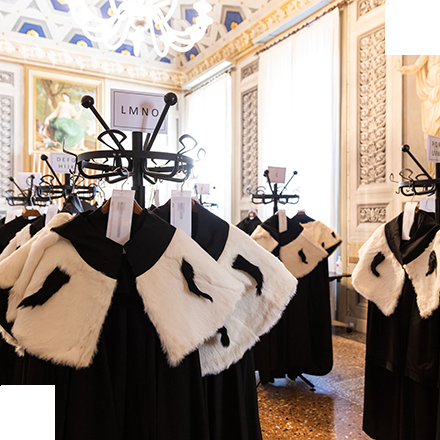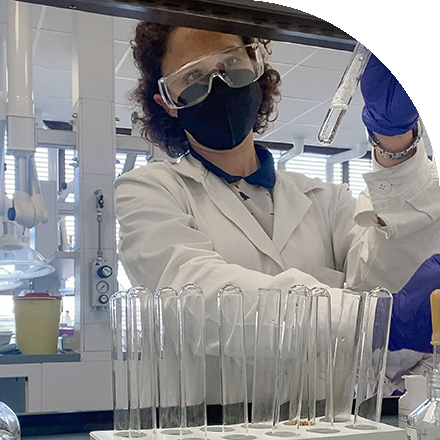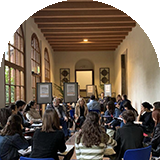Università Cattolica del Sacro Cuore Largo A. Gemelli, 1 - 20123 Milan
Alfredo Ambrosetti
Founder Studio Ambrosetti
Many know the Villa d'Este Forum in Cernobbio, but few know the person who founded it and has been organizing it for forty years (since 2009, Valerio de Molli, the current CEO of the group, has taken over in the role of Ambrosetti): the Cavaliere del Lavoro Alfredo Ambrosetti. When in September the Italian, European and world elites meet in the luxurious hotel on Lake Como to confront and discuss economy and society, the media rarely refer to the name of the founder, but rather to the "Forum of Villa d'Este" or "Cernobbio".
Ambrosetti never wanted so much publicity as president of his consulting firm. On the contrary, it has always focused on discretion to gain credibility and reliability. A winning recipe, which has led the Villa d'Este Forum to be second in Europe only to the World Economic Forum in Davos and Studio Ambrosetti appointed by Penn University as the first Italian think tank . How did it come to this?
Born in 1931, Ambrosetti remembers his university years as a very positive time, but one that was conditioned by family problems: "It was the time of Father Gemelli and of professors of great prestige such as Boldrini, Faleschini, Masotti and Mengoni. Unfortunately my mother required my assistance and I had to travel up and down from Varese. This forced me to limit my attendance at the University and my attendance at lectures to the minimum required attendance and exam times. Basically, I had to take care of almost all my preparation myself, studying from books. After graduating with a degree in Economics, I received 87 job offers. Those were different times!"
Among the many offers, Ambrosetti chose Edison's, and after an initial period of work he moved to the United States thanks to a scholarship to attend specialization courses in four different faculties. After completing his university experience with honors, Ambrosetti spent various periods at the most important companies in the United States and Canada: IBM, Ford, General Motors, Kodak, Standard Oil (now Exxon). Back in Italy after two years in the States, the baggage acquired proves to be fundamental. In the early 1960s, the use of computers in companies in Italy was almost non-existent and Ambrosetti, who in the meantime had returned to Edison, provided consulting outside working hours. When, in 1965, Edison-Volta was nationalized, he was appointed manager (the youngest of the group): "I didn't like nationalization. I was told that I could have an important career but I didn't accept, also because I didn't want to get away from my loved ones. I founded Studio Ambrosetti having, from the beginning, requests for work to be saturated, in addition to me and three other professionals. At the time, there were very few consulting offices in Italy, but the demand for external services was starting to rise considerably."
Today, 87 job offers after university seem like a joke, but the Knight is convinced that, despite the difficulties and the moment of crisis, the approach must remain the same. "A path similar to mine is still possible, but competition has increased. A significant number of young people today follow similar paths to mine, but the extent of the advantage in practice is reduced. When it was my turn, a path like this was needed to emerge. Today, in many respects, it serves to live up to many others. What hasn't changed are the fundamental questions that everyone has to ask themselves: Who are you? Who do you want to become/be? By when? What do you need to acquire to become what you want? Seneca said: "There is no tailwind for those who do not know the port". In an era of accelerating change, it is completely natural for a young person to have to redefine the port several times in life. It is completely pathological, however, not to have, at all times, a defined port."
After its foundation in 1965, Studio Ambrosetti developed into a group of professional entities in Italy and abroad and became a consultant for many multinational and national companies as well as for family businesses (the largest economic asset in our country, according to Ambrosetti). Job requests increase progressively and the Firm gains a credible and reliable image over time. In 1974 the idea of the Forum arrived. "Its birth was born from an intuition on a cold and foggy November evening. We were the first in Italy to launch the AP (Permanent Update) service in all the main regions, aimed at top company managers. I was returning by train with Umberto Colombo, who had conducted a session on the technological scenario in Veneto. It was the era of terrorism, of the Red Brigades, of double-digit inflation, of the oil crisis. At one point I asked him if he thought it logical that we should deal with the economic, socio-political and technological scenario in three separate sessions, when in fact they are strongly interdependent. Columbus shared my concerns and so the Villa d'Este Forum was born, lasting three days dedicated to the respective themes."
The first edition, in July 1975, did not go very well, there were only 14 participants and Ambrosetti began to doubt the validity of the idea and to wonder if it was appropriate to go ahead. "At a certain point, Nino Andreatta (who had given the lecture on the economic scenario, ed.), who was certainly not a champion of humility, said to me: 'I would like to tell you a secret: I have never learned as much as in these three days'. For me, it was the impetus to keep going." Since then, the number of participants in the Forum has steadily increased, also thanks to the participation of Romano Prodi and Franco Modigliani, acquiring an initially European and then global dimension. The structure of the meeting is established in three days dedicated respectively to the global, European and national scenario, a structure that has remained unchanged until today.
"Right from the start, we started aiming for the best possible, including the venue. Over the years, this has made it possible to attract heads of state, top officials of European and world institutions, ministers, Nobel Prize winners, entrepreneurs and managers of great prestige, economists, etc. recalls Ambrosetti, who laughs when asked to name the most important people he has hosted in Cernobbio: "It would be a very long list, this year we are at the fortieth edition. If you count that every year we host an average of 200 participants and that they are all prominent elements in the various sectors...». Agnelli, D'Alema, Berlusconi, Prodi, Monti, Napolitano, Amato, Romiti, Lama, Levi Montalcini, Dulbecco, Trichet, Duisenberg, Barroso, Van Rompuy, Lagard, Gorbachev, Arafat, Peres, Gates, Kissinger, Erdogan, Aznar, Schmidt, D'Estaing, Biden, Cheney, McCain and Ratzinger are just some of the national and international personalities who have passed through the halls of Villa d'Este in the last forty years. All guests of this discreet Varese, who, out of nowhere, has managed to bring together some of the protagonists of the last half century in the same rooms.
Presenza, 2014 – Ne ha fatta di strada by Andrea Prada Bianchi






